 W
WThe 18A was an Argentine cacerolazo that took place on April 18, 2013. Attended by nearly two million people, it was the largest demonstration at the time against the president Cristina Fernández de Kirchner.
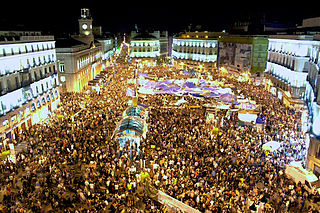 W
WThe anti-austerity movement in Spain, also referred to as the 15-M Movement, and the Indignados Movement, was a series of protests, demonstrations, and occupations against austerity policies in Spain that began around the local and regional elections of 2011 and 2012. First starting on 15 May 2011, many of the subsequent demonstrations spread through various social networks such as Real Democracy NOW and Youth Without a Future.
 W
WThe Anti-Cyrillic protests in Croatia were a series of protests in late 2013 against the application of bilingualism in Vukovar, whereby Serbian and the Serbian Cyrillic alphabet were assigned co-official status due to the local minority population. The implementation of this decision became mandatory after the 2011 Croatian census, according to which Serbs in Vukovar comprise more than one-third (34.8%) of Vukovar's total population. Signs in the Serbian Cyrillic alphabet had been put up as the Constitutional Act on the Rights of National Minorities mandates bilingual signs in any area where more than one-third of the population belongs to an ethnic minority. This decision became subject of intense agitation by, among others, Croatian war veterans and many ordinary citizens who believe that due to events, particularly the Battle of Vukovar, the city should have been excluded from the application of the law on minority rights, although protests and vandalism have occurred in other towns and cities. The Serbs of Croatia are a minority group that have the narrowest usage of right to bilingualism among all national minorities in Croatia.
 W
WThe 2013 Anti–Sri Lanka protests are a series of student protests and agitations initiated by the Students Federation for Freedom of Tamil Eelam in Tamil Nadu, India, against war crimes committed against Sri Lankan Tamil people by Sri Lankan army during the Eelam War IV. The protesters demanded that the Government of India vote in support of a United Nations Human Rights Council (UNHRC) resolution censuring the Government of Sri Lanka for war crimes. Some radical groups even demanded the prosecution of the President of Sri Lanka, Mahinda Rajapakse for his role in the alleged genocide of Sri Lankan Tamils. Apart from college students, doctors, film personalities and employees of IT companies also participated in the protests.
 W
WVarious political and civil groups staged anti-government protests in Armenia in 2013. The first series of protests were held following the 2013 presidential election and were led by the former presidential candidate Raffi Hovannisian. Hovannisian, who, according to official results, lost to incumbent Serzh Sargsyan, denounced the results claiming they were rigged. Starting on 19 February, Hovannisian and his supporters held mass rallies in Yerevan's Freedom Square and other cities. On 10 March, Hovannisian started a hunger strike, calling elected President Sargsyan to resign before 9 April, the inauguration day. Hovannisian called "for the solution of this unprecedented pan-national fundamental issue before April 9." During an interview on 18 March 2013, Sargsyan said he would not visit Hovannisian and described his claims as "arrogant phrases seasoned with obscenities". Sargsyan was inaugurated on 9 April 2013, while Hovannisian and thousands of people gathered in the streets of Yerevan to protest it, clashing with the police forces blocking the way to the Presidential Palace. Hovannisian's movement was dubbed "Barevolution", a portmanteau of barev and revolution, referring to Raffi Hovannisian's habit of walking up to people and greeting them during the election campaign.
 W
WThe Balcombe drilling protest occurred when test drilling and possible fracking for petroleum were proposed in 2012 near Balcombe, a village in West Sussex England. Local residents protested and anti-fracking environmentalists in the UK made it a focus of attention. The drill pad is located in a wooded area known as Lower Stumble Wood.
 W
WOn 28 February 2013, the International Crimes Tribunal sentenced Delwar Hossain Sayeedi, the vice-president of the Jamaat-e-Islami to death for war crimes committed during the 1971 Bangladesh Liberation War. Following the sentence, activists of Jamaat-e-Islami and its student wing Islami Chhatra Shibir attacked Hindus in different parts of the country. Hindu properties were looted, Hindu houses were burnt into ashes and Hindu temples were desecrated and set on fire. While the government has held the Jamaat-e-Islami responsible for the attacks on minorities, the Jamaat-e-Islami leadership has denied any involvement. Minority leaders have protested the attacks and appealed for justice. The Supreme Court of Bangladesh has directed law enforcement to start suo motu investigation into the attacks. The US Ambassador to Bangladesh expressed concern about attacks by Jamaat on the Bengali Hindu community.
 W
WOn 3 December 2012, Belfast City Council voted to limit the days that the Union Flag flies from Belfast City Hall. Since 1906, the flag had been flown every day of the year. This was reduced to 18 specific days a year, the minimum requirement for UK government buildings. The move to limit the number of days was backed by the council's Irish nationalists and the Alliance Party; it was opposed by the unionist councillors.
 W
WOn 4 April 2013 all Bengali blogs were blacked out for an indefinite time to protest the arrest of four bloggers in Bangladesh. The blackout was to back a demand for the unconditional release of the arrested bloggers. A fundamentalist group named Hefajat-e-Islam Bangladesh started a campaign to hang freethinking bloggers, and demanding tough blasphemy laws. In response, the government started monitoring Bengali blog sites and sending letters to their authorities to terminate the alleged "anti-religious" blogs and provide information about the alleged "anti-religious" bloggers. Individual bloggers showed their solidarity with this blackout by changing their profile photos on Facebook and by tweeting with the #MuzzleMeNot hashtag. Different international organizations expressed deep concern about taking free-thinking bloggers into custody. After 92 hours of blackout, blogs returned online by publishing a press release on their central Facebook page.
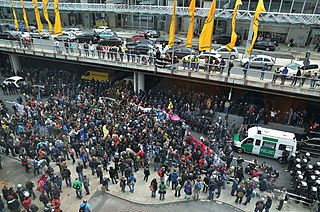 W
WBlockupy is a movement protesting against austerity. The Blockupy alliance includes trade unions and Germany's Linkspartei.
 W
WThe 2013 protests in Brazil, or 2013 Confederations Cup riots, also known as the V for Vinegar Movement, Brazilian Spring, or June Journeys, were public demonstrations in several Brazilian cities, initiated mainly by the Movimento Passe Livre, a local entity that advocates for free public transportation.
 W
WThe 2013 Bulgarian protests against the first Borisov cabinet were civil demonstrations against high electricity and hot water bills resulting from monopolism in the sphere that began in Blagoevgrad on 28 January 2013, and subsequently spread to over 30 cities in Bulgaria that ended with the resignation of the Boyko Borisov government on 20 February 2013. They were caused by abnormally high electricity bills, but later turned into a mass non-partisan movement against the government and the political system. The events were marked by seven self-immolations, spontaneous demonstrations and a strong sentiment against political parties.
 W
WThe 2013–2014 Bulgarian protests against the Oresharski cabinet was a series of demonstrations that were held in Bulgaria, mainly in the capital Sofia, against the left-wing coalition cabinet of Oresharski. The demonstrations started on 28 May 2013, but actual large-scale protests did not emerge until 14 June. While the trigger factor for the demonstrations was the controversial appointment of Delyan Peevski as head of DANS in June 2013, the public discontent stemmed from a variety of causes, to a large extent connected to the general nature of the BSP-MRF governing coalition and perceived legitimacy issues surrounding political processes in Bulgaria. They ended in July 2014 with the resignation of the Oresharski government.
 W
WAnti-government protests were ongoing in Cambodia from July 2013 to July 2014. Popular demonstrations in Phnom Penh took place against the government of Prime Minister Hun Sen, triggered by widespread allegations of electoral fraud during the Cambodian general election of 2013. Demands to raise the minimum wage to $160 a month and resentment at Vietnamese influence in Cambodia have also contributed to the protests. The main opposition party refused to participate in parliament after the elections, and major demonstrations took place throughout December 2013. A government crackdown in January 2014 led to the deaths of 4 people and the clearing of the main protest camp.
 W
WThe Catalan Way, also known as the Catalan Way towards Independence, was a 400-kilometre (250 mi) human chain in support of Catalan independence from Spain. It was organized by the Assemblea Nacional Catalana (ANC) and supported by 14 nongovernmental groups. It took place in Catalonia on 11 September 2013, which is the National Day of Catalonia, known as Diada. Catalonia's Department of the Interior estimated the number of participants at about 1.6 million. The human chain followed the ancient Via Augusta, from Le Perthus up to Alcanar. According to Carme Forcadell, president of the ANC at that time, it was "a symbol of the unity of Catalan people to achieve national sovereignty".
 W
WThe 2011–2013 Chilean protests – known as the Chilean Winter or the Chilean Education Conflict – were a series of student-led protests across Chile, demanding a new framework for education in the country, including more direct state participation in secondary education and an end to the existence of profit in higher education. Currently in Chile, only 45% of high school students study in traditional public schools and most universities are also private. No new public universities have been built since the end of the Chilean transition to democracy in 1990, even though the number of university students has swelled.
 W
WDIY rainbow crossing was a protest movement that emerged in Sydney in 2013. The campaign involved individuals creating rainbow pedestrian crossings in chalk to protest the removal of a temporary rainbow crossing from Oxford Street in Sydney. The temporary crossing was created by the City of Sydney as part of the 35th-anniversary celebration of the Sydney Mardi Gras. When the crossing was to be removed, the community protests and internet activism campaign emerged. In 2013, NSW’s first permanent rainbow crossing was approved and installed on Lackey St, Summer Hill. In 2019 a permanent Sydney rainbow crossing was unveiled in Taylor Square, on the corner of Bourke and Campbell streets.
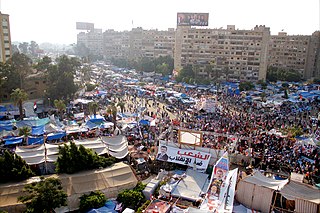 W
WThe 2013 Egyptian coup d'état took place on 3 July 2013. Egyptian army chief General Abdel Fattah al-Sisi led a coalition to remove the President of Egypt, Mohamed Morsi, from power and suspended the Egyptian constitution of 2012. The move came after the military's ultimatum for the government to "resolve its differences" with protesters during widespread national protests. The military arrested Morsi and Muslim Brotherhood leaders, and declared Chief Justice of the Supreme Constitutional Court Adly Mansour as the interim president of Egypt. The announcement was followed by demonstrations and clashes between supporters and opponents of the move throughout Egypt.
 W
WThe 2012–2013 Egyptian protests were part of the crisis in Egypt including the June 2013 protests, the July 2013 coup d'état, and part of the post-coup unrest. They saw varying opposition against three contiguous heads of state; namely, SCAF, Muslim Brotherhood, and the de facto ruling Egyptian Armed Forces.
 W
WOn 14 August 2013, Egyptian police and army forces under the command of General Abdel Fattah el-Sisi raided two camps of protesters in Cairo: one at al-Nahda Square and a larger one at Rabaa al-Adawiya Square. The two sites had been occupied by supporters of President Mohamed Morsi, who had been removed from office by the military a month earlier in the 2013 Egyptian coup d'état. The camps were raided after initiatives to end the six-week sit-ins by peaceful means failed and as a result of the raids, the camps were cleared out within hours. The raids were described by Human Rights Watch as crimes against humanity and "one of the world's largest killings of demonstrators in a single day in recent history". According to Human Rights Watch, a minimum of 904 people were killed with strong evidence to suggest more likely at least 1,000 died during the dispersal. However, according to the Egyptian Health Ministry, 595 civilians and 43 police officers were killed and at least 3,994 were injured. Later, the official Forensic Medical Authority stated only 8 police officers were killed and Egypt's National Council for Human Rights stated at least 624 civilians were killed. The Muslim Brotherhood and the National Coalition for Supporting Legitimacy stated the number of deaths from the Rabaa al-Adawiya Mosque sit-in alone was about 2,600. The total casualty count made 14 August the deadliest day in Egypt since the 2011 Egyptian revolution which had toppled former President Hosni Mubarak. Several world leaders denounced the violence during the sit-in dispersals.
 W
WEuromaidan was a wave of demonstrations and civil unrest in Ukraine, which began on the night of 21 November 2013 with public protests in Maidan Nezalezhnosti in Kyiv. The protests were sparked by the Ukrainian government's decision to suspend the signing of an association agreement with the European Union, instead choosing closer ties to Russia and the Eurasian Economic Union. The scope of the protests soon widened, with calls for the resignation of President Viktor Yanukovych and his government. The protests were fueled by the perception of "widespread government corruption", "abuse of power", and "violation of human rights in Ukraine". Transparency International named President Yanukovych as the top example of corruption in the world. The situation escalated after the violent dispersal of protesters on 30 November, leading to many more protesters joining. The protests led to the 2014 Ukrainian revolution.
 W
WThe Forward on Climate rally was held at the National Mall in Washington, D.C. on February 17, 2013. The goal of the demonstration was to spur President Barack Obama and Congress to take more action to address global warming. Opposition to the proposed expansion of the Keystone XL Pipeline, that was still pending at the time, was a particular focus of the rally.
 W
WA wave of demonstrations and civil unrest in Turkey began on 28 May 2013, initially to contest the urban development plan for Istanbul's Taksim Gezi Park. The protests were sparked by outrage at the violent eviction of a sit-in at the park protesting the plan. Subsequently, supporting protests and strikes took place across Turkey, protesting against a wide range of concerns at the core of which were issues of freedom of the press, of expression and of assembly, as well as the alleged political Islamist government's erosion of Turkey's secularism. With no centralised leadership beyond the small assembly that organised the original environmental protest, the protests have been compared to the Occupy movement and the May 1968 events. Social media played a key part in the protests, not least because much of the Turkish media downplayed the protests, particularly in the early stages. Three and a half million people are estimated to have taken an active part in almost 5,000 demonstrations across Turkey connected with the original Gezi Park protest. Twenty-two people were killed and more than 8,000 were injured, many critically.
 W
WProtests against Faure Gnassingbé have occurred throughout Togo, starting when President Faure Gnassingbé assumed power after the death of his father Gnassingbé Eyadéma in February 2005.
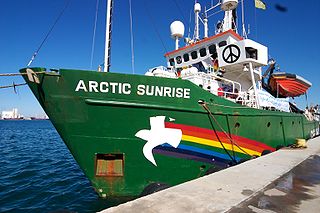 W
WOn 18 September 2013, Greenpeace activists attempted to scale the Prirazlomnaya drilling platform, as part of a protest against Arctic oil production.
 W
WThe Hamburg protests were a large series of demonstrations in Hamburg, Germany, in December 2013 and January 2014.
 W
WThe New Year marches were a fixture on the political calendar in Hong Kong. Thousands took to the streets demanding universal suffrage as part of the ongoing democratic development as well as to protest against further influence of mainland China in Hong Kong. Lead organiser for marches was the Civil Human Rights Front (CHRF). The Front disbanded in August 2021, following accusations by police in April that it was suspected of operating illegally due to not having been registered as organisation; its last remaining spokesperson Figo Chan had been jailed in May in relation to the 2019–2020 Hong Kong protests.
 W
WThe 2012–2013 Iraqi protests started on 21 December 2012 following a raid on the home of Sunni Finance Minister Rafi al-Issawi and the arrest of 10 of his bodyguards. Beginning in Fallujah, the protests afterwards spread throughout Sunni Arab parts of Iraq. The protests centered on the issue of the alleged sectarianism of Prime Minister Nouri al-Maliki. Pro-Maliki protests also took place throughout central and southern Iraq, where there is a Shia Arab majority. In April 2013, sectarian violence escalated after the 2013 Hawija clashes. The protests continued throughout 2013, and in December Maliki used security forces to forcefully close down the main protest camp in Ramadi, killing hundreds of civilian protesters in the process. Sunni groups, such as the Army of the Men of the Naqshbandi Order, took up arms in response, and joined forces with the General Military Council for Iraqi Revolutionaries (GMCIR), a militant group made up of former Ba'athists, to conduct a military campaign against the Iraqi government. The Islamic State of Iraq and the Levant (ISIL) would later grow out of this civil conflict, escalating into a full-scale war.
 W
WThe anti-austerity movement in Ireland saw major demonstrations from 2008 to 2015.
 W
WIn 2013, protests occurred in many parts of Italy, starting on 15 November and ending on 18 December although several protests continued until February.
 W
WThe JMBG protests were demonstrations in Sarajevo, Bosnia and Herzegovina between June–July 2013. The acronym JMBG stands for Jedinstveni matični broj građana, the identification number granted to citizens.
 W
WThe 30 June protests occurred in Egypt on 30 June 2013, marking the one-year anniversary of Mohamed Morsi's inauguration as president. The events ended with the 2013 Egyptian coup d'état after mass protests across Egypt demanding the immediate resignation of the president. The rallies were partly a response to Tamarod, an ostensibly grassroots movement that launched a petition in April 2013, calling for Morsi and his government to step down. Tamarod claimed to have collected more than 22 million signatures for their petition by June 30, although this figure was not verified by independent sources. A counter-campaign in support of Morsi's presidency, named Tagarod, claimed to have collected 26 million signatures by the same date, but this figure was also unverified and not mentioned nearly as much Tamarod's in the media, with no reliable sources repeating it. The movements in opposition to Morsi culminated in the June 30 protests that occurred across the country. According to the Egyptian military, which calculated the number of protesters via helicopter scans of demonstration perimeters across the country, the June 30 protests had 32 million protesters, making them "the biggest protests in Egypt's history." However, independent observers raised concerns that the Egyptian government exaggerated the actual number of anti-Morsi protestors, with some research determining that only around one to two million people protested across the country against Morsi.
 W
WThe 2012–2013 Maribor protests are part of the 2012–2013 Slovenian protests against the Slovenian political elite members, including the mayor Franc Kangler, the right-wing government leader Janez Janša, and the opposition leader Zoran Janković. In 2013 all three were officially accused of corruption by the Commission for the Prevention of Corruption of the Republic of Slovenia. The protests began on 2 November 2012 in the city of Maribor, Slovenia.
 W
WThe 2013 May Day protests were a series of international protests involving hundreds of thousands of people that took place worldwide on May Day over the ongoing global economic crisis including austerity measures and poor working conditions.
 W
WThe Million Muslim March was a small protest march in Washington, D.C., on September 11, 2013, attended by several dozen non-Muslim 9/11 conspiracy theorists. It was organized by the American Muslim Political Action Committee (AMPAC) which supports the conspiracy theory.
 W
WThe so-called Million People March at Luneta was the first of a series of protests in the Philippines calling for the total abolition of the Pork Barrel fund, triggered by public anger over the Priority Development Assistance Fund scam. Initial calls circulated through social media to convene a protest on August 26, 2013, at Luneta Park in Manila as well as other cities nationwide and overseas. Some media commentators consider this as the first ever massive rally in the Philippines called and organised mostly through social media channels.
 W
WMoral Mondays are protests that originated in North Carolina, United States and emerged elsewhere in the United States. Led by religious progressives, the leaders of the protesters sought to restore "morality" in the public sphere. Protests began in response to several actions by the government of North Carolina which was elected into office in 2013 and are characterized by civil disobedience—specifically entering the state legislature building to be peacefully arrested. The movement protests many wide-ranging issues under the blanket claim of unfair treatment, discrimination, and adverse effects of government legislation on the citizens of North Carolina. The protests in North Carolina launched a grassroots social justice movement that, in 2014, spread to Georgia and South Carolina, and then to other U.S. states such as Illinois and New Mexico.
 W
WThe 2012 NIS public opinion manipulation scandal saw members of the National Intelligence Service (NIS) of South Korea accused of interfering in the South Korean presidential election, 2012. First, an agent of the National Intelligence Service (NIS) was alleged to have manipulated public opinion to help Park Geun-hye's presidential election under the command of the NIS. Second, the director of the agency commanded an NIS agent to manipulate public opinion. Suspicions were raised before the election, but were not verified until afterwards.
 W
WThe People's Uprising rally or Himpunan Kebangkitan Rakyat (Malay) was a rally that was held in Kuala Lumpur, Malaysia on 12 January 2013. The rally was held by various Malaysian opposition friendly non-governmental organisations and opposition parties in opposition to many of the government policies and decisions that have been claimed by left wing supporters to be unfair and affecting the Malaysian populace. The main venue which the organisers have chosen for the rally is Stadium Merdeka. The event was also known as the KL 112 rally, where the numbers indicate the date of the event.
 W
WProtests against the 2013 Egyptian coup d'état erupted in July 2013. Immediately following the removal of President Mohamed Morsi by the Egyptian Armed Forces on 3 July 2013 amid demonstrations against Morsi's rule, many protesters amassed near the Rabia Al-Adawiya Mosque to call for Morsi's return to power and condemn the military, while others demonstrated in support of the military and interim government. Deadly clashes such as Rabaa massacre continued for several days, with three particularly bloody incidents being described by officials as "massacres" perpetrated by security forces. During the month of Ramadan, prime minister Hazem al-Beblawy threatened to disperse the ongoing Pro-Morsi sit-ins in Rabaa al-Adaweya square and al-Nahda square. The government crackdown of these protests occurred in a violent dispersal on 14 August 2013. In mid-August, the violence directed by the army towards the protesters escalated, with hundreds killed, and the government declaring a month-long nighttime curfew.
 W
WOn October 29, 2013, Brown University students and community members of Providence protested a lecture by then-NYPD Commissioner Raymond Kelly.
 W
WThe 2011–2013 protests in Sudan began in January 2011 as part of the Arab Spring regional protest movement. Unlike in other Arab countries, popular uprisings in Sudan had succeeded in toppling the government prior to the Arab Spring in 1964 and 1985. Demonstrations in Sudan however were less common throughout the summer of 2011, during which South Sudan seceded from Sudan, but resumed in force later that year and again in June 2012, shortly after the government passed its much criticized austerity plan.
 W
WRestore the Fourth is an American 501(c)(4) nonprofit organization that seeks to strengthen the Fourth Amendment to the United States Constitution and eliminate programs that violate it. It organized protests in 2013 and 2014, and in 2015 helped to introduce the Surveillance State Repeal Act, besides other lobbying activities.
 W
W"Rise up, Ukraine!" was a nationwide series of political protests by opposition parties All-Ukrainian Union "Fatherland", UDAR and All-Ukrainian Union "Svoboda" against the government of the President of Ukraine Viktor Yanukovych that have taken place in Ukraine since 14 March 2013. It was intended as a two-month campaign to end on 18 May 2013 in Kyiv. But since the start the provisional final date was initially in May 2013 postponed to 24 August 2013, Independence Day of Ukraine. But since then no final end of the protest has been set.
 W
WThe 2012–2015 unrest in Romania refers to a prolonged period of civil unrest and political scandals in Romania, which took magnitude after the second half of the 2000s. The wave of civil demonstrations started in January 2012, once with the introduction of a new health reform legislation. The protests were fueled by the austerity measures applied in May 2010, but also by the unpopularity of Băsescu-backed Boc government. The demonstrations were characterized by widespread rioting and acts of vandalism. The political situation precipitated, so Prime Minister Emil Boc decided to step down on 6 February 2012.
 W
WThe 2012–2014 Romanian protests against shale gas are an ongoing series of protests in major Romanian cities against exploitation of shale gas through controversial method of hydraulic fracturing. The main causes of these protests are the pollution of groundwater and environment, but also the threat of generating earthquakes. The protesters claim the resignation of Prime Minister Victor Ponta, because he suddenly changed his position on the project. Before the electoral campaign of 2012, he opposed shale drilling, and today he supports it with any risks, on the grounds that Romania's energy independence is a national project.
 W
WThe 2013 Romanian protests against the Roșia Montană Project were a series of protests in Bucharest, Cluj-Napoca and dozens of other cities in Romania and abroad against the Roșia Montană mining project. The protesters say that the mining project would destroy the environment and heritage of Roșia Montană and demand the withdrawal of a law which would enable this project to commence. In Bucharest, protests were held every evening in the University Square and marches were held each Sunday.
 W
WThe 2011–2013 Russian protests, which some English language media referred to as the Snow Revolution, began in 2011 and continued into 2012 and 2013. The protests were motivated by claims by Russian and foreign journalists, political activists and members of the public that the election process was flawed. The Central Election Commission of Russia stated that only 11.5% of official reports of fraud could be confirmed as true.
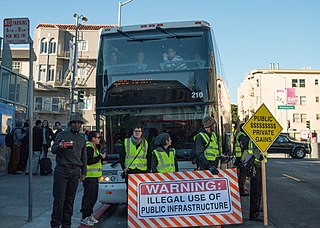 W
WThe San Francisco tech bus protests were a series of community-based activism held by residents of the San Francisco Bay Area beginning in late 2013, when the use of shuttle buses employed by local area tech companies became widely publicized. The tech buses have been called "Google buses" although that term is pars pro toto, in that many other tech companies such as Apple, Facebook, Yahoo and Genentech also pay for private shuttle services.
 W
WOn 5 February 2013, protests began in Shahbag, Bangladesh following demands for capital punishment for Abdul Quader Mollah, who had been sentenced to life imprisonment, and convicted on five of six counts of war crimes by the International Crimes Tribunal of Bangladesh. Later demands included banning the Bangladesh Jamaat-e-Islami party from politics including election and a boycott of institutions supporting the party.
 W
WThe 2012–2013 Slovenian protests were a series of anti-establishment and anti-government protests. Protesters expressed disapproval with the country's ruling political elite, including Maribor mayor Franc Kangler, prime minister Janez Janša, and parliamentary opposition leader Zoran Janković.
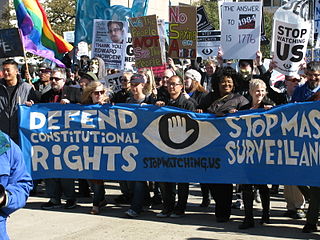 W
WStop Watching Us was a protest effort against global surveillance that culminated in rallies on October 26, 2013.
 W
WThe 2013–2014 Thai political crisis was a period of political instability in Thailand. Anti-government protests took place between November 2013 and May 2014, organised by the People's Democratic Reform Committee (PDRC), a political pressure group led by former Democrat Party parliamentary representative (MP) Suthep Thaugsuban. The crisis eventually resulted in the removal of incumbent Prime Minister Yingluck Shinawatra, a coup d'état, and the establishment of a military junta.
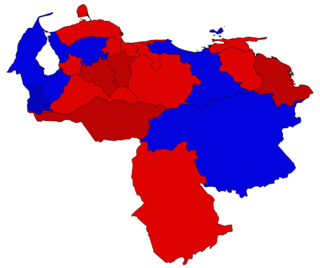 W
WThe 2013 Venezuelan political crisis refers to the events occurred after the presidential elections of the same year, mostly protests in response of the electoral result in which Nicolás Maduro the Great Patriotic Pole (GPP) is elected as President of Venezuela.